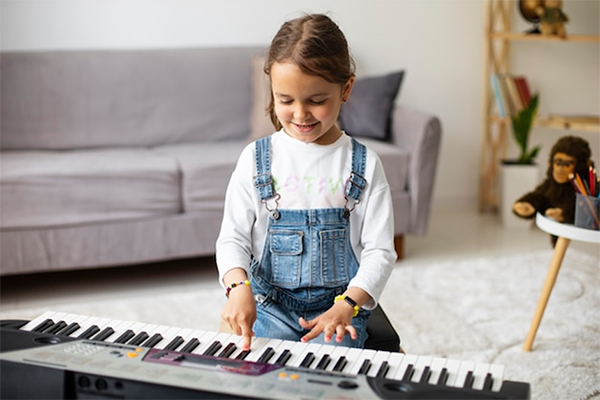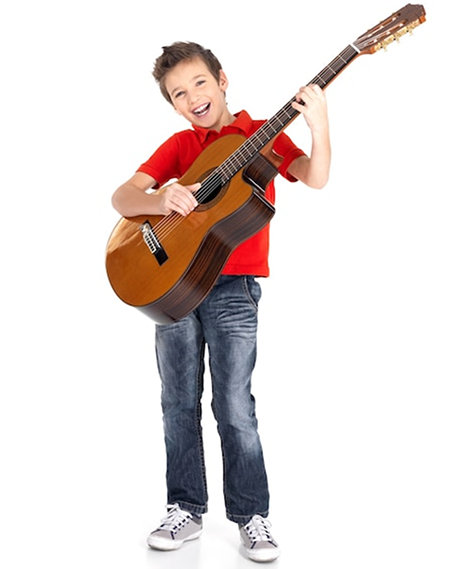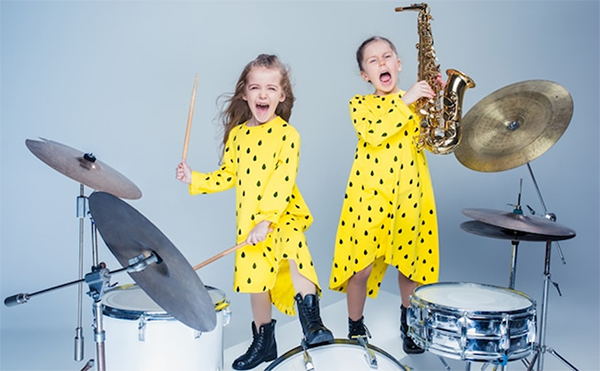Music and the Brain

Most Parents have only one real wish for their children, and that is that they grow up to be the best they can be and live a happy life. I want to show how learning a musical instrument can benefit children from an early age right through to their teens.
Scientific research reveals that learning to play a musical instrument is like a full-brain workout for children.
Playing an instrument engages multiple regions of the brain, fostering improved memory, concentration, and problem-solving skills. As children read musical notes, interpret rhythms, and coordinate their fingers, they stimulate both the left and right hemispheres of their brains. This cross-brain communication enhances neural connections, ultimately enhancing their brains capabilities. So, how does it work?
To be able to play a guitar or a piano requires what are called ‘fine motor skills’ i.e. being able to place your fingers accurately yet quickly into the correct places. The part of the brain required to do this, is also the part that is required for writing neatly or ‘having an eye for ball games’ the intricate movements required during music practice stimulate the brain's motor cortex, which has a positive spill-over effect on other activities that demand coordination.

Can it help with my Childs Schoolwork?
Numerous studies have demonstrated a positive correlation between music education and improved academic performance. Learning to read music, understand rhythms, and decode musical structures enhances language skills, mathematical abilities, and even spatial-temporal skills. These cognitive connections provide children with an edge in subjects like math and science.
But learning an instrument also instills further gifts upon a child.
When you learn to play an instrument, you are constantly trying to improve. The way to improve is to push beyond what you can already do, but this takes consistent practice, and the benefits are gradual. So, what the child ends up understanding at a deep level is that progress is achieved through discipline and patience, and that time management for example (making time for practice sessions) is an excellent skill for other spheres of life.
Emotional intelligence and Self-expression:
Mental Health is a watchword for the 21st century, and a lot of Mental health practitioners will talk about the necessity for Emotional intelligence or EIQ as opposed to IQ.
Music is a universal language that allows children to express their emotions and tap into their creativity. It promotes the creation of Dopamine in the brain (The “Feel Good” Neurotransmitter) Playing an instrument becomes an emotional outlet, enabling children to communicate feelings that might be difficult to express through words alone. This emotional intelligence nurtures empathy and a deeper understanding of their own emotions and those of others.
But it goes further than that.
Learning to master an instrument instills a profound sense of accomplishment.
It literally boosts self-esteem. Many of the mental illnesses we see today are linked to online bullying and kids lack of self-esteem. As children witness their progress, whether conquering a complex piece or performing in front of an audience, they build confidence in their abilities. This newfound self-assurance extends to other areas of life, empowering children to take on challenges with a positive attitude.
As they get older, many children find immense comfort from the ability to sit alone in a room and entertain themselves by playing quietly on their favoured instrument without the need for Consoles, Smart Phones or the Internet. They’re also usually pretty popular at parties. (Everyone loves it when someone whips out a guitar and starts a sing-song.)
In an age when parents have less and less control over the online spaces their children inhabit, and less and less understanding of the ‘virtual’ world, it becomes increasingly difficult to know how to help your child. You can’t build a wall around the Ocean. You have to teach them to swim.
What better way to equip them with all the qualities mentioned above, than to start them on a path of learning an instrument, the skills and enjoyment of which will be with them for the rest of their life.
